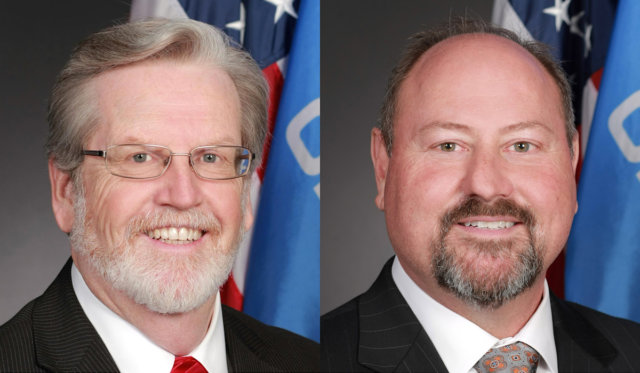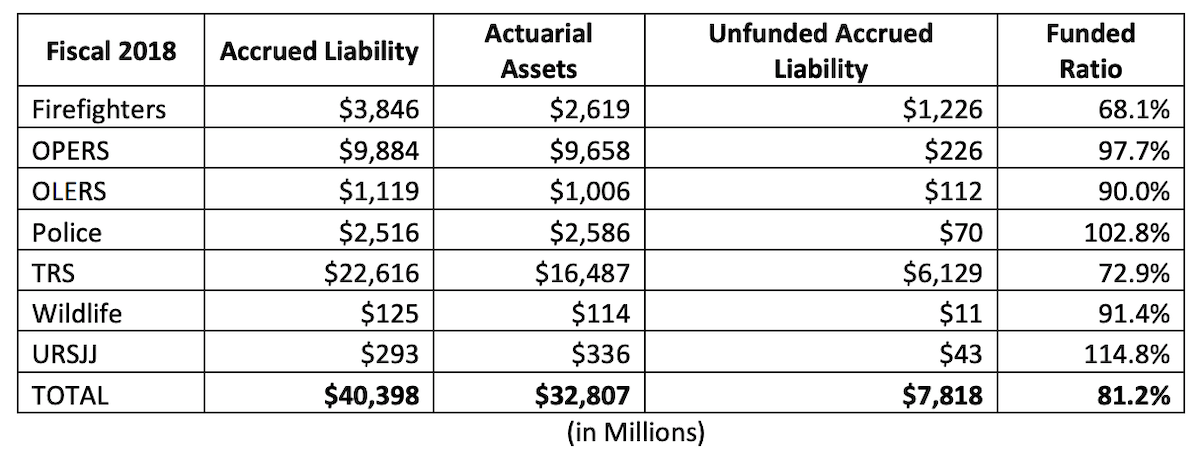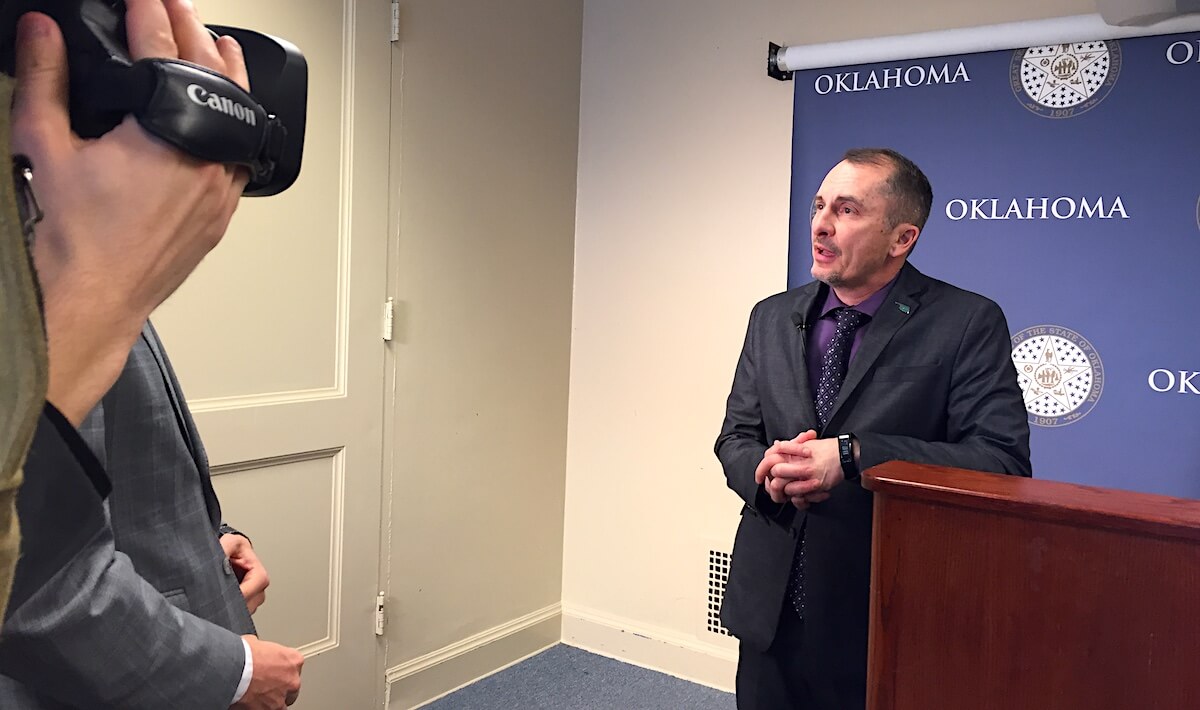
(Editor’s note: Later in March 2019, HB 2304 was amended to increase the proposed COLA for pensions from 2 percent to 4 percent. The story below still refers to the original 2 percent proposal. On Thursday, April 11, the Senate Retirement and Insurance Committee amended the bill back to a 2 percent adjustment and voted to send it to an actuary to study until the 2020 Oklahoma legislative session.)
Rep. Avery Frix (R-Muskogee) wants to increase monthly payments to retired teachers, firefighters, peace officers, judges and other state employees. Called a “cost of living adjustment,” a COLA for pensions would be authorized under Frix’s HB 2304, which advanced through committee Wednesday.
“It’s been over 10 years since our retirees have had a cost of living adjustment,” Frix said. “This came to my attention because I have a particular retired teacher who lives in my district, and her insurance is more than her retirement check every month. So I felt like it’s time to do something.”
How to do that “something” will be a question for the remainder of session, as a COLA for pensions could be funded in two different ways: by direct appropriation from the Legislature, or by tweaking statute to allow greater payments from existing pension fund balances.
The budget leaders of each chamber differ on which method would be most prudent.
House Appropriations and Budget Chairman Kevin Wallace (R-Wellston) said he believes any COLA for pensions should be financed without increasing the systems’ unfunded liabilities, which have improved dramatically in recent years.
“I think that’s the reason we got into the position we were in — giving COLAs out of the pensions every two years because it’s election year,” Wallace said. “That’s not good policy.”
But Senate Appropriations and Budget Chairman Roger Thompson (R-Okemah) holds a different belief.
“For me personally, if there’s going to be a COLA, it needs to come out of the pension funds,” Thompson said.
Asked Thursday how a COLA for pensions could be funded, Senate President Pro Tempore Greg Treat (R-OKC) deferred to Thompson.
“I’ve empowered my appropriations chair to have latitude in negotiations,” Treat said. “So Sen. Thompson, whatever he has told you, I’m standing behind.”
Harder: Stitt appreciates ‘robust discussion’

Oklahoma has seven pension systems, each with a different “funded ratio” determined by dividing actuarial assets by accrued liabilities.
In Gov. Kevin Stitt’s proposed FY 2020 executive budget, references to recent reforms are followed by a warning about how a COLA paid through existing pension assets would affect funded ratios.
“Multiple reform measures have put the states seven pension systems on a path to fiscal stability, but the Teachers Retirement System at 72.9 percent funded and the Firefighters system at 68.1 percent still need many more years to achieve financial soundness,” the administration wrote. “Attempts to weaken previous reforms or add additional costs to the system will negatively affect progress and could harm the state’s bond rating.”
During a budgetary preview with media hours ahead of Stitt’s Feb. 4 State of the State address, Secretary of Budget Mike Mazzei said the governor “feels strongly” about continuing to improve pensions’ financial positions.
Donelle Harder, deputy secretary of state, said Tuesday that Stitt is engaged in and appreciates “the robust discussion” about a COLA for pensions.
“He is always open to making changes if he is presented with good data,” Harder said. “I can tell you that the governor has an open door, and if people want to come and talk to him about how we address COLA increases for pensions, he’s willing to listen. And anyone who presents good data, he’s very open to how we go about making adjustments.”
Firefighters: ‘It’s time’ for a COLA
However a COLA for pensions might be funded by this year’s Legislature, those receiving the pensions say the boost in retirement checks is crucial.
“COLAs are necessary because they help retirees’ benefits keep up with the cost of inflation, which on average is 2.7 percent per year,” said Kris Masterman, executive director of Keep Oklahoma’s Promises, a public pension coalition. “Since the cost of groceries, health care and housing has increased, Oklahoma’s retirees are often struggling to keep up with their payments.”
Representatives of specific employment sectors also advocated for a COLA agreement. Scott Van Horn, OKC Firefighters Local 157 president, said the pension checks of retired firefighters “are being swallowed by rising health care costs.”
“They are hurting,” Van Horn said Tuesday. “Over the past eight years, the Legislature made changes to our state pension systems which considerably increased funding ratios. I believe legislators put our systems in a position where they can now afford to grant a reasonable COLA. It’s time.”
Van Horn said authorizing a 2 percent COLA from existing deposits would only lower the firefighter system’s funded ratio by about 1 percent.
Amanda Ewing, Oklahoma Education Association associate executive director, agreed. She said a COLA should be paid for out of the Teachers Retirement System’s “billions of dollars worth of assets” instead of with new appropriations.
“It can handle it. It won’t take a major financial hit,” Ewing said. “We are more than capable of enduring paying a cost of living adjustment out of the system, which means we won’t have to use a dollar of state revenue to fund those COLAs.”
With lawmakers able to appropriate more revenue than they did last year, the OEA is advocating for a teacher pay raise and other education investments.
“The cost of a COLA is enormous when you’re trying to fund it with new state revenue, so you’re looking at the cost of a COLA taking up every bit of new money that the state is seeing this year,” she said.
‘Therefore is the consternation’
Last year, lawmakers approved a one-time 2 percent stipend for retirees, which Frix referred to as “a 13th check.”
He said his bill this year would provide a 2 percent increase across all checks by authorizing a one-time exemption to statute that requires any COLA to be funded by new legislative appropriation.
“One of the misconceptions on it is it does not set up triggers for the future, so we’re not doing a 2 percent COLA every two years,” he said, adding that some of the pension systems are funded near or above 100 percent. “We feel like it’s necessary to pay for the COLA out of those pension systems themselves.”
But Wallace cautioned that the Teachers Retirement System is the state’s largest pension system.
“That 2 percent COLA will impact the teachers’ retirement more than any other pension, and it’s at 73 percent funded,” Wallace said. “We put in statute that any COLAs have to be paid for. Obviously we don’t have enough money to pay for a teacher pay raise, a state employee pay raise, investments into other agencies and the COLA.”
Thompson echoed his House counterpart.
“I would be in agreement with that statement,” Thompson said. “Therefore is the consternation of how we get this done.”
State employee pay bills advance

Wednesday, lawmakers also advanced bills regarding state employee pay.
HB 2673, carried by Wallace, would provide a $2,500 across-the-board pay raise for state employees. It passed the House Appropriations and Budget Committee 30-0 and is estimated to have a $100 million cost.
“If you want good customer service, you have to pay your employees,” said Sterling Zearley, executive director of the Oklahoma Public Employees Association. “It’s no different than the private sector. To hire and retain qualified employees, you need to pay them a decent salary. We’re still 24 percent below the private sector. That includes salaries and benefits. So basically we’re a training ground, and we are losing great employees to the private sector.”
Advancing from the same committee Wednesday was HB 2465 by Rep. Jason Dunnington (D-OKC) which would require state agencies to pay overtime for salaried employees making under $37,500 and would prohibit agencies from requiring ill employees to take compensatory time instead of sick leave.
“Over the past few years, state employees have always taken a back seat to teachers when it comes to wages,” Dunnington said. “But in many cases, they are just as valuable and need to be compensated for their work for the state.”
(Editor’s note: The OKC Firefighters Local 157 has purchased advertising on NonDoc in 2019.)





















